AI Agents for Healthcare: Types, Roles, and Top Tools
- BLOG
- Artificial Intelligence
- September 20, 2025
Healthcare systems are stretched thin. With staff shortages, rising patient demands, and growing admin work, it’s clear that traditional methods aren’t enough. That’s why many hospitals and clinics are now turning to AI agents for healthcare, a smart tool that handles tasks like symptom checking, documentation, and real-time alerts. These agents support doctors, nurses, and even patients by making care faster and more efficient. In this blog, you’ll get a clear look at what AI agents are, how they’re being used in real healthcare settings and the roles they serve. Plus, we’ve shortlisted the 10 best AI platform for healthcare leading this shift in 2025.
Contents
- 1 What are AI Agents for Healthcare?
- 2 Core Capabilities of Healthcare AI Agents
- 3 Build Smarter Healthcare AI with Webisoft.
- 4 Types of AI Agents Used in Healthcare
- 5 10 Best AI Agents for Healthcare
- 5.1 1. IBM Watson- Analyze Patient Report (For Doctors)
- 5.2 2. Nabla- Clinical Note Generation (For Doctors)
- 5.3 3. Nuance DAX- Ambient Charting in Busy Practices (For Doctors)
- 5.4 4. Suki- Voice-Enabled Documentation (For Doctors)
- 5.5 5. Aidoc – For Radiology and Emergencies (For Doctors+Nurses)
- 5.6 6. Google Med-PaLM 2- Clinical Question Answering (For Doctors)
- 5.7 7. Sensely – Virtual Nurse Triage and Patient Navigation (For Patients)
- 5.8 8. Florence – Medication Reminders (For Patients)
- 5.9 9. Biofourmis – Remote Monitoring and Risk Alerts (For Nurses)
- 5.10 10. Notable – Admin and Workflow Tasks (For Nurses + Admins)
- 6 Webisoft’s Expertise in AI Agents for Healthcare
- 7 Final Thoughts
- 8 Frequently Asked Question
What are AI Agents for Healthcare?
AI agents for healthcare are intelligent software tools that help doctors, nurses, and patients by automating tasks like triage, documentation, and alerts. They use AI technologies to support clinical workflows and improve care without replacing human professionals. If you work in healthcare, you know how busy and complex things can get. AI agents are built to handle repetitive and time-consuming tasks like checking symptoms, organizing patient data, or sending important reminders. This allows you to focus more on direct patient care and decision-making. These agents work in the background, supporting both staff and patients through smart decisions and real-time responses. They don’t replace anyone on your team, instead, they make your work easier, faster, and more accurate across the care journey.
Core Capabilities of Healthcare AI Agents
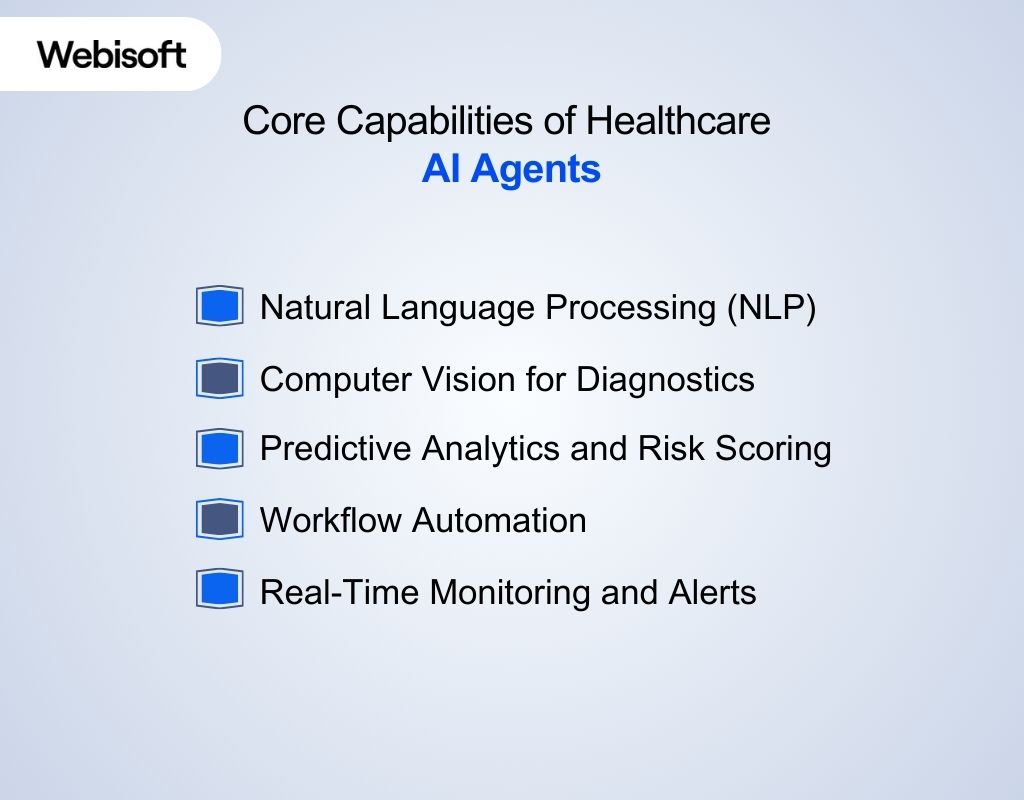 AI agents for healthcare are more than just smart chatbots. They come with powerful features that support real clinical work. Below are the capabilities that can make a real difference in your healthcare environment.
AI agents for healthcare are more than just smart chatbots. They come with powerful features that support real clinical work. Below are the capabilities that can make a real difference in your healthcare environment.
Natural Language Processing (NLP)
AI agents use NLP to understand and process medical notes, patient messages, and clinical documentation. This helps them extract key information quickly and accurately. You can save hours by letting the agent summarize charts, analyze conversations, or even generate notes, all in natural, readable language.
Computer Vision for Diagnostics
Some AI agents are trained to analyze medical images like X-rays, MRIs, and pathology slides. They can detect patterns or abnormalities that might be hard to spot right away. This helps radiologists and doctors make faster, more informed decisions with an extra layer of confidence.
Predictive Analytics and Risk Scoring
These agents can look at patient history, lab results, and real-time vitals to predict risks, like the chance of readmission, infection, or deterioration. With this insight, you can take early action, personalize treatment, and improve patient outcomes before a small issue becomes critical.
Workflow Automation
AI agents for healthcare handle time-consuming tasks such as scheduling, billing, and record updates. They connect across your systems and keep everything running smoothly. This frees up your team from admin-heavy work and lets them focus on high-value tasks that need human attention.
Real-Time Monitoring and Alerts
AI agents can track patient data from monitors, devices, or EHRs in real time. If something goes out of range, like heart rate or oxygen level they immediately alert the care team. This ensures you never miss a critical update, even in busy environments.
Build Smarter Healthcare AI with Webisoft.
Get custom AI agents customized to your healthcare system’s needs.
Types of AI Agents Used in Healthcare
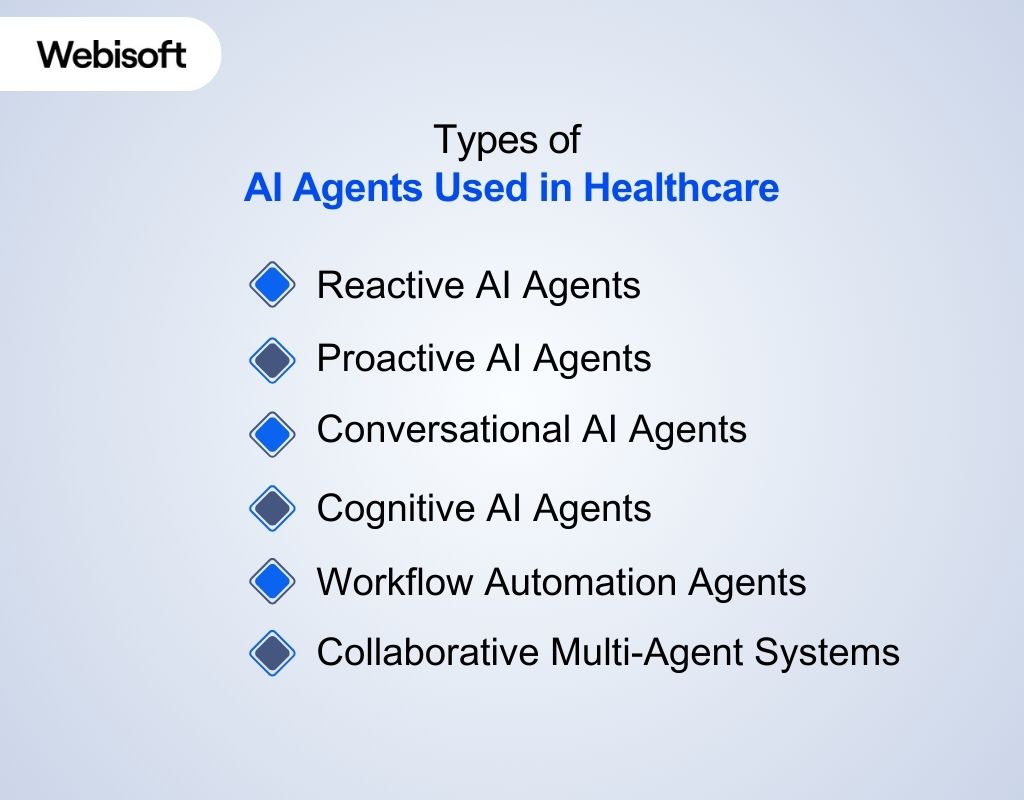 AI agents for healthcare come in different forms, each built for a specific purpose. Some respond to patient needs, while others help doctors and nurses behind the scenes. Here are the main types of AI agents for healthcare.
AI agents for healthcare come in different forms, each built for a specific purpose. Some respond to patient needs, while others help doctors and nurses behind the scenes. Here are the main types of AI agents for healthcare.
Reactive AI Agents
These agents respond immediately to inputs without storing past data. They’re often used for tasks like symptom checking or answering basic questions. They follow rules and deliver fast results, making them ideal for first-level patient support or triage in healthcare settings. Examples:
- Ada Health – A symptom checker that gives users instant health insights based on basic input.
- Buoy Health – An AI chatbot that guides patients to the appropriate care based on their symptoms.
Proactive AI Agents
Proactive agents don’t wait for input; they monitor data and act when needed. For example, they can track a patient’s vitals and alert the care team before something goes wrong. This helps catch issues early and keeps patients safer through real-time response. Example:
- Current Health – Continuously monitors vitals and alerts clinicians if a patient’s condition deteriorates.
- HealthLoop – Sends automated check-ins and alerts providers if patients deviate from expected recovery paths.
Conversational AI Agents
These agents interact with users through voice or text, using natural language processing. Patients can ask questions, schedule visits, or get health tips. For doctors, these agents can take notes or assist during appointments, improving communication without adding extra work. Examples:
- Nuance DAX – Assists doctors during appointments by transcribing and structuring medical conversations.
- Babylon Health – Lets users chat with an AI doctor for health advice, appointment booking, and wellness tips.
Cognitive AI Agents
Cognitive agents analyze data to assist with complex decision-making. They help doctors by offering diagnostic suggestions, flagging potential risks, or recommending treatments. These agents rely on medical knowledge, AI models, and real-time data to support better clinical decisions. Examples:
- IBM Watson for Oncology – Reviews medical literature to suggest cancer treatment options.
- Aidoc – Helps radiologists by flagging critical findings in medical imaging like strokes or pulmonary embolisms.
Workflow Automation Agents
These agents handle repetitive tasks like billing, coding, and documentation. They run in the background, making sure healthcare operations stay on track. By reducing manual workload, they help staff save time, avoid errors, and focus more on patient care. Examples:
- Olive AI – Handles administrative tasks like prior authorization, eligibility checks, and claims management.
- Notable Health – Automates charting, scheduling, and documentation using ambient AI.
Collaborative Multi-Agent Systems
These involve multiple AI agents working together, each handling different parts of a care process. Like, one agent manages intake, another monitors vitals, and a third supports documentation. They share information in real time, creating a coordinated and seamless experience that is made possible through full-stack AI product development. Examples:
- Qventus – Uses multiple AI agents to manage hospital operations, from patient intake to discharge planning.
- DeepMind’s Streams (used by NHS) – One agent monitors vitals, another tracks lab results, and together they alert care teams in emergencies.
10 Best AI Agents for Healthcare
 AI agents are reshaping how care is delivered by helping doctors, nurses, and patients manage tasks with greater ease. This list of AI agents for healthcare highlights 10 tools making a real difference in clinical settings.
AI agents are reshaping how care is delivered by helping doctors, nurses, and patients manage tasks with greater ease. This list of AI agents for healthcare highlights 10 tools making a real difference in clinical settings.
1. IBM Watson- Analyze Patient Report (For Doctors)
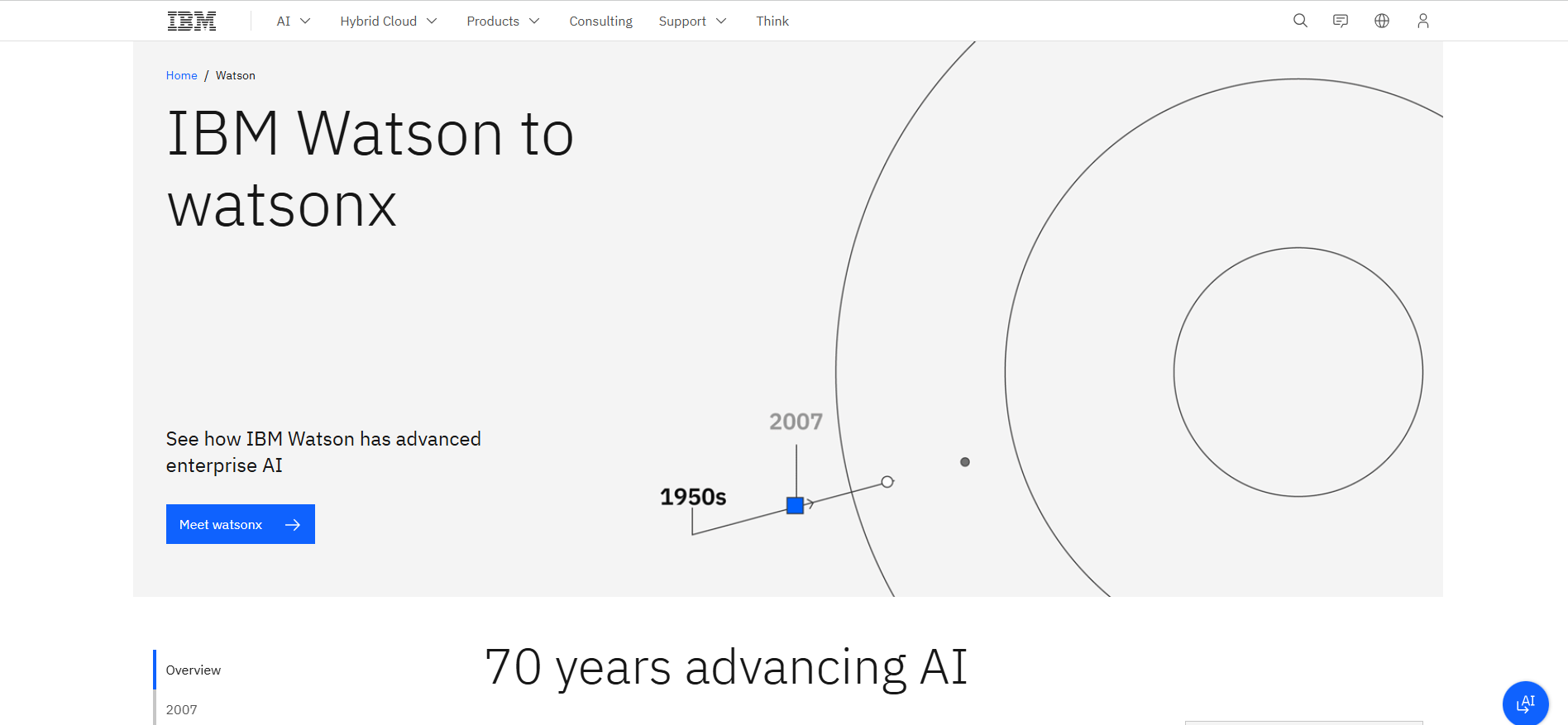 IBM Watson helps you make smarter healthcare decisions by analyzing complex data—fast. It reads patient records, medical literature, and clinical guidelines to suggest accurate diagnoses and treatments, especially for cancer care. You can also use Watson to automate tasks like answering insurance questions or managing patient queries through AI chat. This saves time for your team and improves patient experience. If you’re working in healthcare, Watson acts like a reliable second opinion—backed by data, not guesswork. It’s built to support both clinical and administrative decisions without slowing down your workflow.
IBM Watson helps you make smarter healthcare decisions by analyzing complex data—fast. It reads patient records, medical literature, and clinical guidelines to suggest accurate diagnoses and treatments, especially for cancer care. You can also use Watson to automate tasks like answering insurance questions or managing patient queries through AI chat. This saves time for your team and improves patient experience. If you’re working in healthcare, Watson acts like a reliable second opinion—backed by data, not guesswork. It’s built to support both clinical and administrative decisions without slowing down your workflow.
Features:
AI-Powered Clinical Decision Support
IBM Watson analyzes patient records alongside vast medical literature to assist in making accurate clinical decisions. It’s especially valuable in complex fields like oncology, where treatment paths require evidence-based choices.
Natural Language Processing (NLP)
Watson can read and understand free-text data such as doctor’s notes, radiology reports, and discharge summaries. This helps surface important insights that would otherwise stay buried in unstructured records.
Virtual Assistants for Patients & Staff
Watson Assistant powers AI chatbots that can handle insurance questions, appointment scheduling, and symptom checks around the clock. This reduces call center load and improves response time for patients.
Data Integration Across Systems
Watson connects with EHRs, CRMs, and other platforms to create a unified, real-time view of patient data. This integration ensures smoother coordination between care teams and systems.
Workflow Automation
Watson automates repetitive tasks like claim processing, follow-up scheduling, and prior authorizations. This frees up clinicians and admin staff to focus more on patient care, not paperwork.
2. Nabla- Clinical Note Generation (For Doctors)
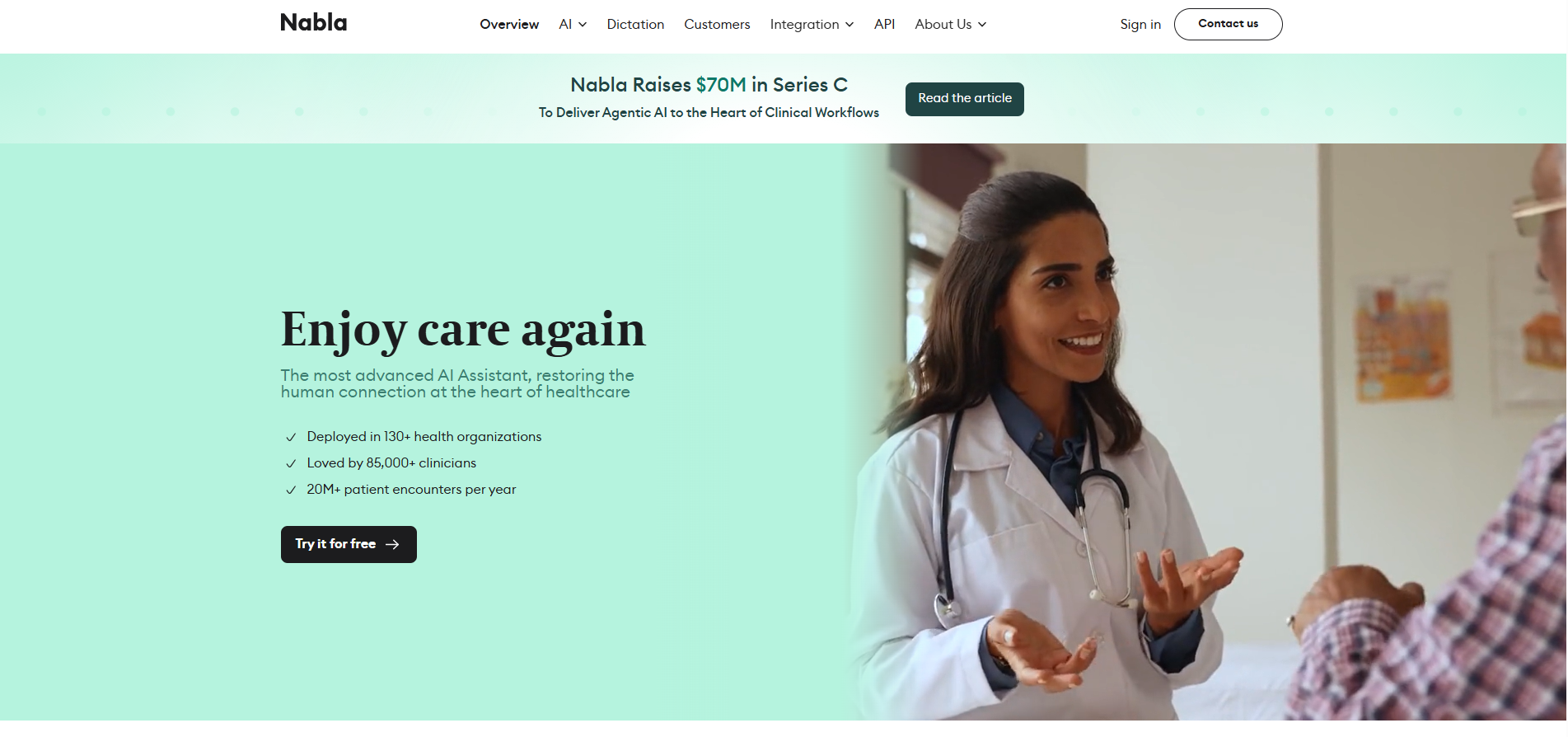 Nabla is a leading ambient AI assistant used by doctors, nurses, and care teams to simplify clinical workflows. It automatically captures patient conversations and turns them into structured notes within seconds. So clinicians spend less time typing and more time engaging with patients. Deployed in over 130 health organizations and used by more than 85,000 clinicians across 55+ specialties, Nabla saves approximately 2 hours per day on documentation and reduces clinician fatigue up to 90%. It integrates seamlessly with major EHR systems like Epic, Cerner, Athenahealth, and NextGen, without storing audio data and staying fully HIPAA‑compliant with SOC 2 and ISO 27001 certifications.
Nabla is a leading ambient AI assistant used by doctors, nurses, and care teams to simplify clinical workflows. It automatically captures patient conversations and turns them into structured notes within seconds. So clinicians spend less time typing and more time engaging with patients. Deployed in over 130 health organizations and used by more than 85,000 clinicians across 55+ specialties, Nabla saves approximately 2 hours per day on documentation and reduces clinician fatigue up to 90%. It integrates seamlessly with major EHR systems like Epic, Cerner, Athenahealth, and NextGen, without storing audio data and staying fully HIPAA‑compliant with SOC 2 and ISO 27001 certifications.
Features:
Ambient AI Built for Frontline Speed
Nabla listens to the full clinical conversation without interrupting or needing prompts. Doctors can speak naturally, and the AI generates accurate notes instantly in the background.
Medical-Grade Structuring with Entity Mapping
The system doesn’t just transcribe, it identifies and organizes key clinical elements like symptoms, medications, and treatment plans. Notes are automatically formatted to meet SOAP or narrative documentation standards.
Autonomous Agent-Led Charting and Pre-Visit Prep
Nabla’s AI scans previous patient records and highlights what matters before the visit starts. It recommends charting structures and templates to help clinicians begin to be more focused and better informed.
Multi-Agent Expansion for Care Teams
Beyond doctors, Nabla is building AI agents for nurses, assistants, and admin staff. Each agent handles role-specific tasks, enabling faster, smoother teamwork across departments.
Invisible Compliance Layer with Adaptive Auditing
As notes are generated, Nabla checks for completeness, relevance, and billing accuracy in the background. This reduces audit risk without adding extra work for the clinician.
3. Nuance DAX- Ambient Charting in Busy Practices (For Doctors)
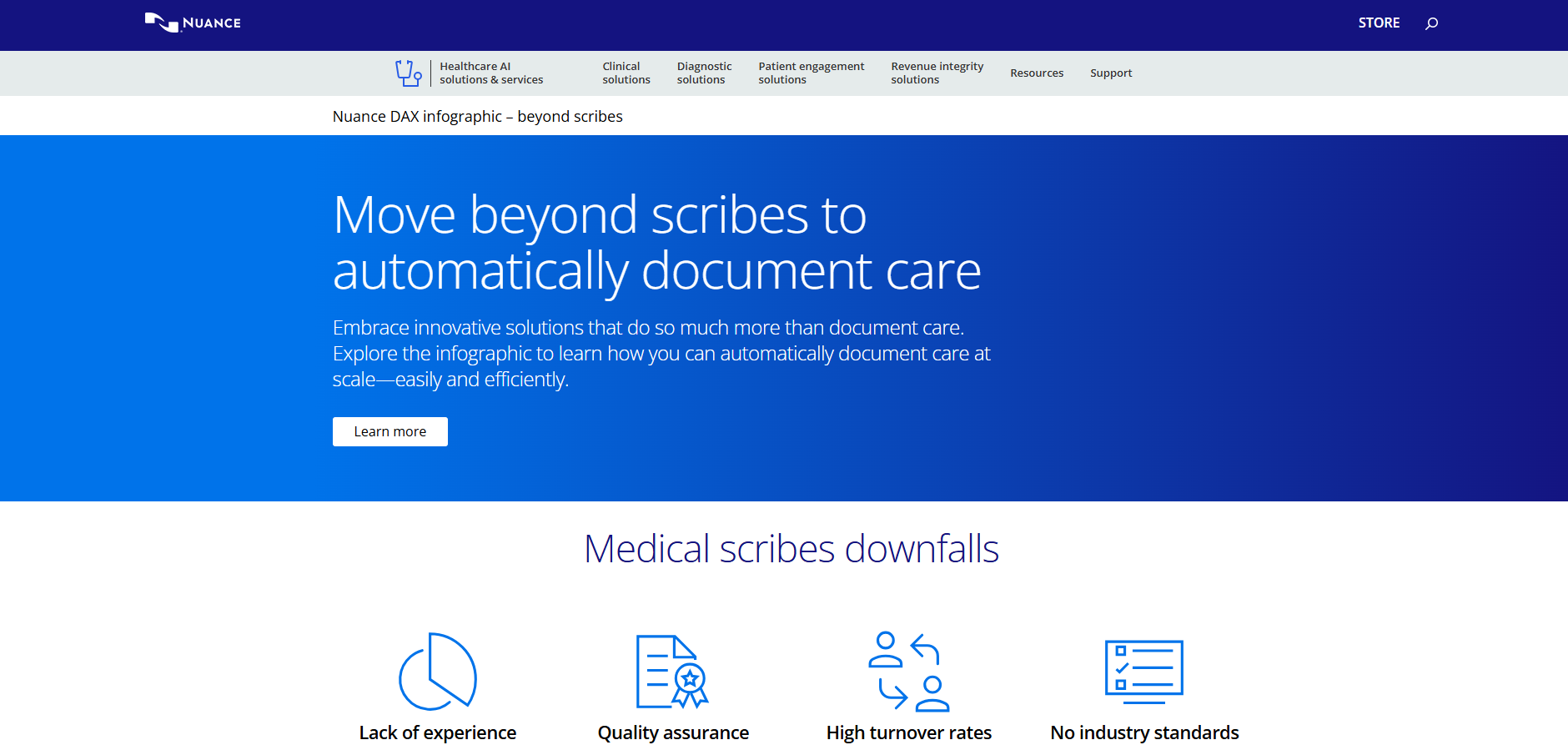 Nuance DAX Copilot is an AI-powered clinical documentation solution designed to make life easier for doctors. It listens quietly during patient visits and automatically creates structured clinical notes, thus saving you from having to type or dictate after every appointment. Built on Microsoft Azure, DAX Copilot is secure, fast, and fully compliant with HIPAA standards. It integrates with over 200 EHR systems, making it easy to fit into your existing workflow. It also supports features like after-visit summaries and referral letters, helping you complete documentation tasks faster. Doctors using DAX report saving up to 7 minutes per patient, which adds up quickly in a full day of care. Whether you’re in primary care or a specialty clinic, DAX Copilot helps reduce administrative burden and supports a smoother, more focused care experience.
Nuance DAX Copilot is an AI-powered clinical documentation solution designed to make life easier for doctors. It listens quietly during patient visits and automatically creates structured clinical notes, thus saving you from having to type or dictate after every appointment. Built on Microsoft Azure, DAX Copilot is secure, fast, and fully compliant with HIPAA standards. It integrates with over 200 EHR systems, making it easy to fit into your existing workflow. It also supports features like after-visit summaries and referral letters, helping you complete documentation tasks faster. Doctors using DAX report saving up to 7 minutes per patient, which adds up quickly in a full day of care. Whether you’re in primary care or a specialty clinic, DAX Copilot helps reduce administrative burden and supports a smoother, more focused care experience.
Features:
Specialty-Specific Language Understanding
DAX is trained across multiple medical specialties, allowing it to understand clinical terms, context, and workflows unique to fields like cardiology, orthopedics, or pediatrics. This ensures documentation is not only accurate but also clinically relevant to your specific domain.
Context-Aware Summarization
Instead of transcribing conversations word-for-word, DAX uses AI to capture meaning and intent that turns natural dialogue into precise summaries. It understands nuance in patient communication, including concerns, conditions, and physician assessments.
Automatic Note Customization Based on Provider Preferences
DAX adapts to your note-taking style over time. Whether you prefer narrative notes, bullet points, or SOAP format, the system learns your documentation habits and adjusts its outputs accordingly.
Continuous AI Learning with Human Review Loop
To maintain high accuracy, DAX combines automated note generation with optional human validation. This hybrid model improves learning, reduces errors, and ensures that your final notes meet medical and legal standards.
Integrated Voice Commands for Post-Visit Actions
Beyond documentation, DAX allows clinicians to use simple voice commands to complete tasks like ordering labs, scheduling follow-ups, or sending referrals. This simplifies care actions without leaving the room or navigating complex interfaces.
4. Suki- Voice-Enabled Documentation (For Doctors)
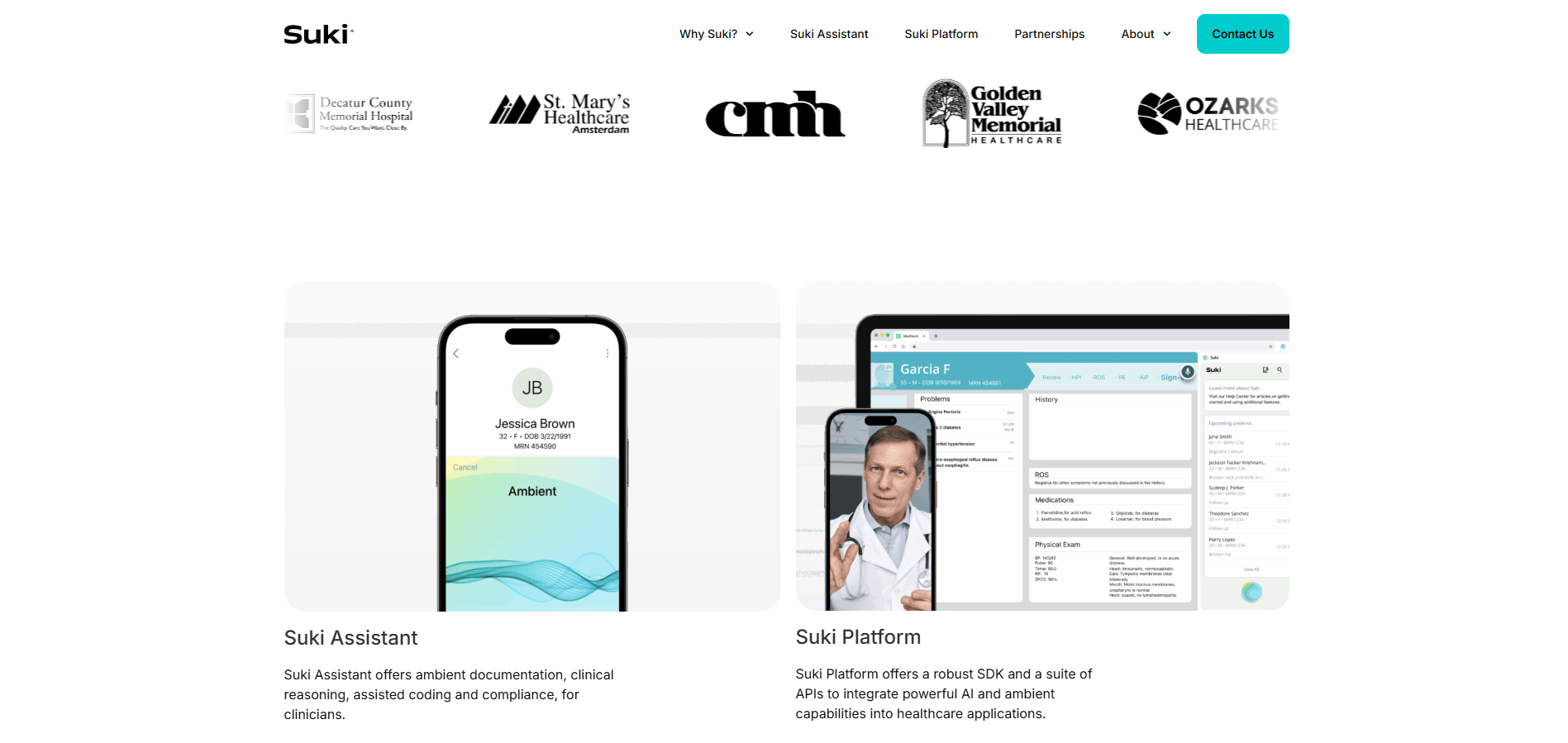 Suki Assistant is an AI-powered voice assistant built to reduce the burden of clinical documentation. It listens during patient visits and generates accurate notes in real time, helping you spend more focus on patients and less time typing. Beyond note-taking, Suki now offers patient summaries and clinical Q&A powered by Google Cloud. This means you can quickly review key patient history or ask questions like “Latest medications?” and get instant, useful answers. It integrates deeply with major EHRs like Epic, Cerner, Athena, and MEDITECH, so your notes and orders flow directly into your system without manual steps. Moreover, clinicians report using Suki assists in saving over 70% documentation time and better work-life balance.
Suki Assistant is an AI-powered voice assistant built to reduce the burden of clinical documentation. It listens during patient visits and generates accurate notes in real time, helping you spend more focus on patients and less time typing. Beyond note-taking, Suki now offers patient summaries and clinical Q&A powered by Google Cloud. This means you can quickly review key patient history or ask questions like “Latest medications?” and get instant, useful answers. It integrates deeply with major EHRs like Epic, Cerner, Athena, and MEDITECH, so your notes and orders flow directly into your system without manual steps. Moreover, clinicians report using Suki assists in saving over 70% documentation time and better work-life balance.
Features:
Cross-Device Access
Suki works seamlessly across desktop, mobile, and tablet devices, even within your EHR interface. This gives you full flexibility to dictate, review, or edit notes wherever you are, whether you’re in the exam room, on rounds, or working remotely.
Custom Voice Commands
You can create and use personalized voice shortcuts to speed up documentation. For instance, saying “Insert asthma plan” can auto-fill your prewritten care instructions, helping you save time on repetitive clinical tasks without typing.
Specialty Flexibility
Suki is built to serve multiple medical specialties, not just primary care. It supports custom templates tailored to your documentation needs, whether you’re in cardiology, dermatology, orthopedics, or any other field.
Instant Voice Recognition
Its voice-to-text engine is optimized for speed and accuracy, delivering near real-time transcription. This low-latency processing ensures a smooth experience, even during high-volume clinic hours.
Actionable Usage Analytics
Suki provides reporting on time saved, features used, and voice command patterns. These insights help individual clinicians and larger health systems measure impact and refine workflows over time.
5. Aidoc – For Radiology and Emergencies (For Doctors+Nurses)
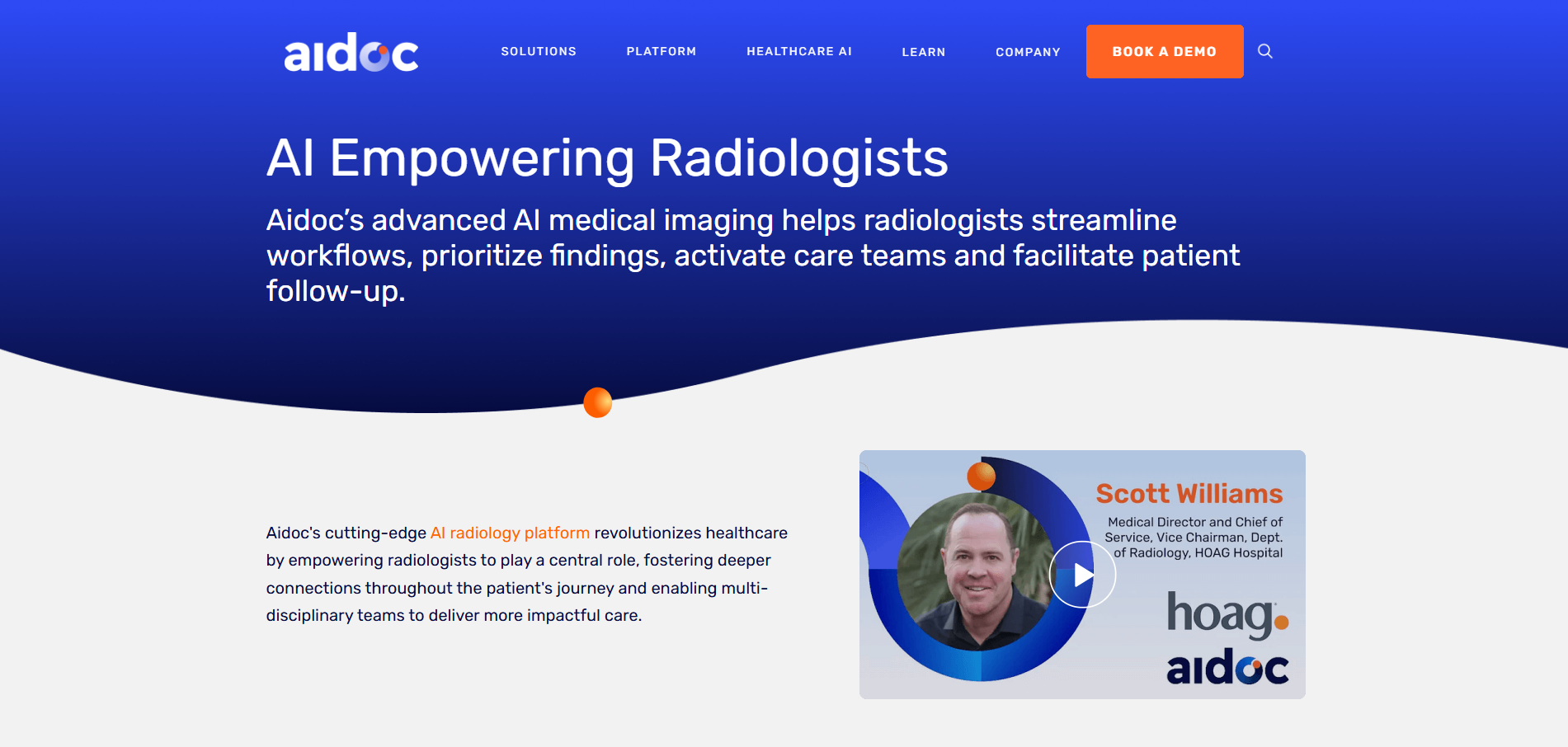 Aidoc is an advanced AI imaging assistant that helps doctors detect urgent conditions from scans, automatically flagging life-threatening findings in CT, MRI, or X-rays. It works seamlessly in the background, triaging critical cases and alerting care teams instantly. Built on the aiOS platform, Aidoc supports over 17 FDA-cleared algorithms and integrates with PACS and EHR systems. It prioritizes speed and accuracy while fitting into your existing workflow. Leading health systems use it for faster diagnosis, shorter emergency stays, and better patient outcomes. For doctors and nurses working with imaging, Aidoc offers reliable support you can trust.
Aidoc is an advanced AI imaging assistant that helps doctors detect urgent conditions from scans, automatically flagging life-threatening findings in CT, MRI, or X-rays. It works seamlessly in the background, triaging critical cases and alerting care teams instantly. Built on the aiOS platform, Aidoc supports over 17 FDA-cleared algorithms and integrates with PACS and EHR systems. It prioritizes speed and accuracy while fitting into your existing workflow. Leading health systems use it for faster diagnosis, shorter emergency stays, and better patient outcomes. For doctors and nurses working with imaging, Aidoc offers reliable support you can trust.
Features:
Always-On AI Layer
Aidoc’s aiOS functions as a continuous clinical AI layer across your hospital systems. It detects abnormalities, triages findings, and keeps care teams informed in real time, without needing to be manually activated.
Smart Care Coordination
Beyond flagging results, Aidoc actively supports cross-team coordination. It routes critical findings to the right specialists, helping reduce treatment delays and speed up decisions across emergency and specialty care.
Condition-Specific AI Bundles
Aidoc offers modular AI tools designed around specific clinical needs like stroke, PE, or brain bleeds. You can choose what fits your case volume and deploy it accordingly.
Cross-Department Integration
Aidoc isn’t just for radiology. It connects ICU, ER, neurology, and cardiology teams so they all work from the same AI-powered findings and improve coordinated care.
Real-Time Performance Insights
Aidoc gives hospitals performance data like alert-to-response time, treatment decisions, and overall workflow impact. This helps track how AI is improving care and identify where to fine-tune adoption.
6. Google Med-PaLM 2- Clinical Question Answering (For Doctors)
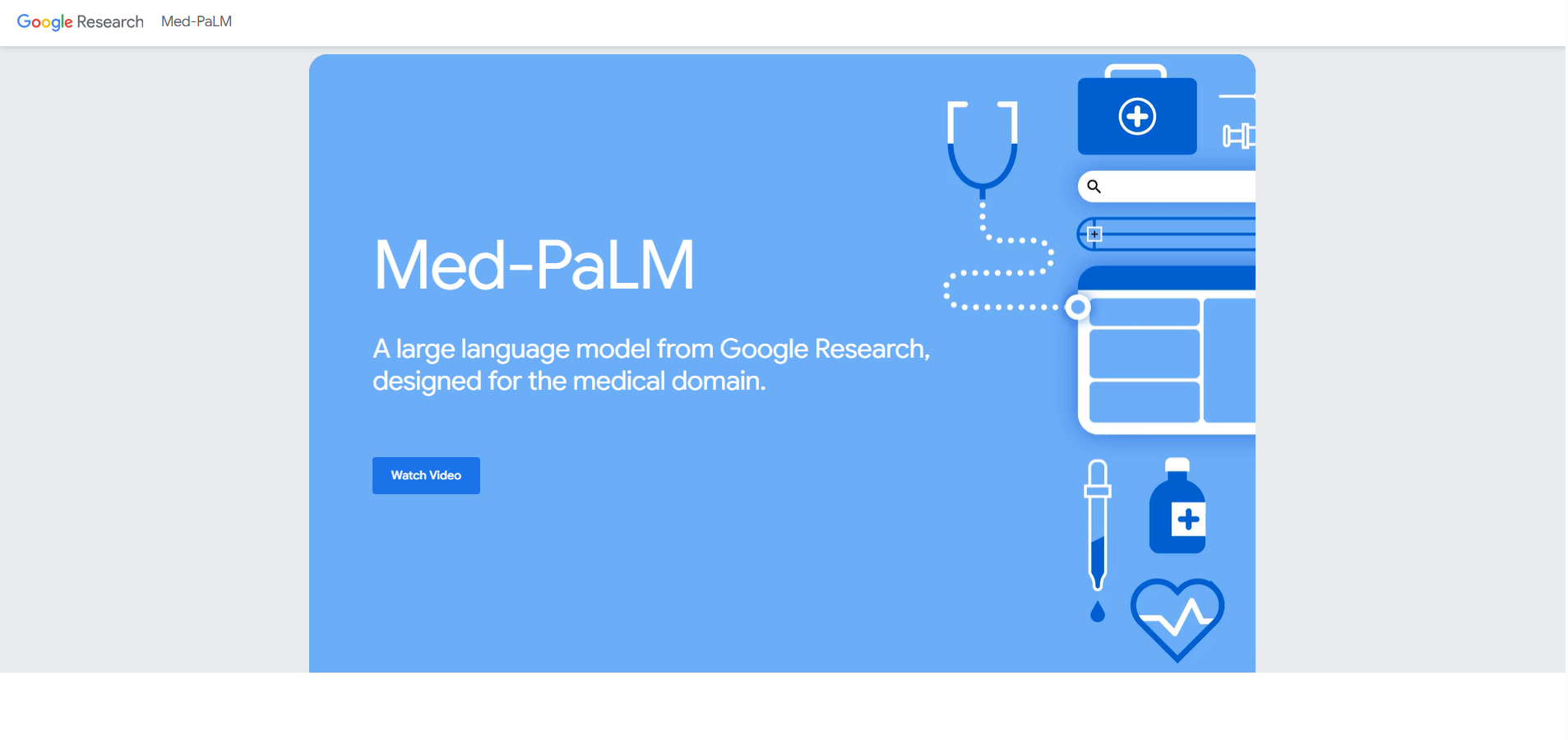 Google Med‑PaLM 2 is a powerful medical language model fine‑tuned to understand healthcare terminology and reasoning. It delivers accurate, human‑level answers to clinical questions, scoring over 86% on exam benchmarks compared to physician performance. You can ask complex medical queries like diagnosis reasoning, treatment guidance, or drug interactions. In return, you get detailed, context-aware responses that are clinically reviewed for safety and quality. Although still in controlled use, Med-PaLM 2 is being piloted through Google Cloud as part of the MedLM suite. It powers applications such as clinical documentation support, patient Q&A, and intelligent clinical workflows.
Google Med‑PaLM 2 is a powerful medical language model fine‑tuned to understand healthcare terminology and reasoning. It delivers accurate, human‑level answers to clinical questions, scoring over 86% on exam benchmarks compared to physician performance. You can ask complex medical queries like diagnosis reasoning, treatment guidance, or drug interactions. In return, you get detailed, context-aware responses that are clinically reviewed for safety and quality. Although still in controlled use, Med-PaLM 2 is being piloted through Google Cloud as part of the MedLM suite. It powers applications such as clinical documentation support, patient Q&A, and intelligent clinical workflows.
Features:
Exam-Level Medical Reasoning
Med-PaLM 2 demonstrates performance comparable to expert physicians on benchmark medical exams like the USMLE. It’s trained to reason through clinical prompts, not just retrieve facts, thus making it ideal for supporting high-stakes medical decisions.
Multimodal Input Support
Google is developing multimodal capabilities for Med-PaLM 2, allowing it to process not just text, but also images like X-rays and lab charts. This opens the door to more comprehensive clinical AI support.
Custom Fine-Tuning with MedLM
Through the MedLM framework on Google Cloud, organizations can fine-tune Med-PaLM 2 for their specific needs. This includes hospital workflows, patient education, or specialty care like oncology or cardiology.
Bias and Safety Evaluation Framework
Med-PaLM 2 includes built-in mechanisms to evaluate potential bias, hallucinations, or unsafe responses. This ensures answers are aligned with clinical guidelines and can be reviewed for trustworthiness before being deployed in real-world care.
Language Adaptability
It’s designed to perform across diverse populations and languages, enabling global health applications. This makes it more inclusive for multi-lingual patient support and international healthcare deployments.
7. Sensely – Virtual Nurse Triage and Patient Navigation (For Patients)
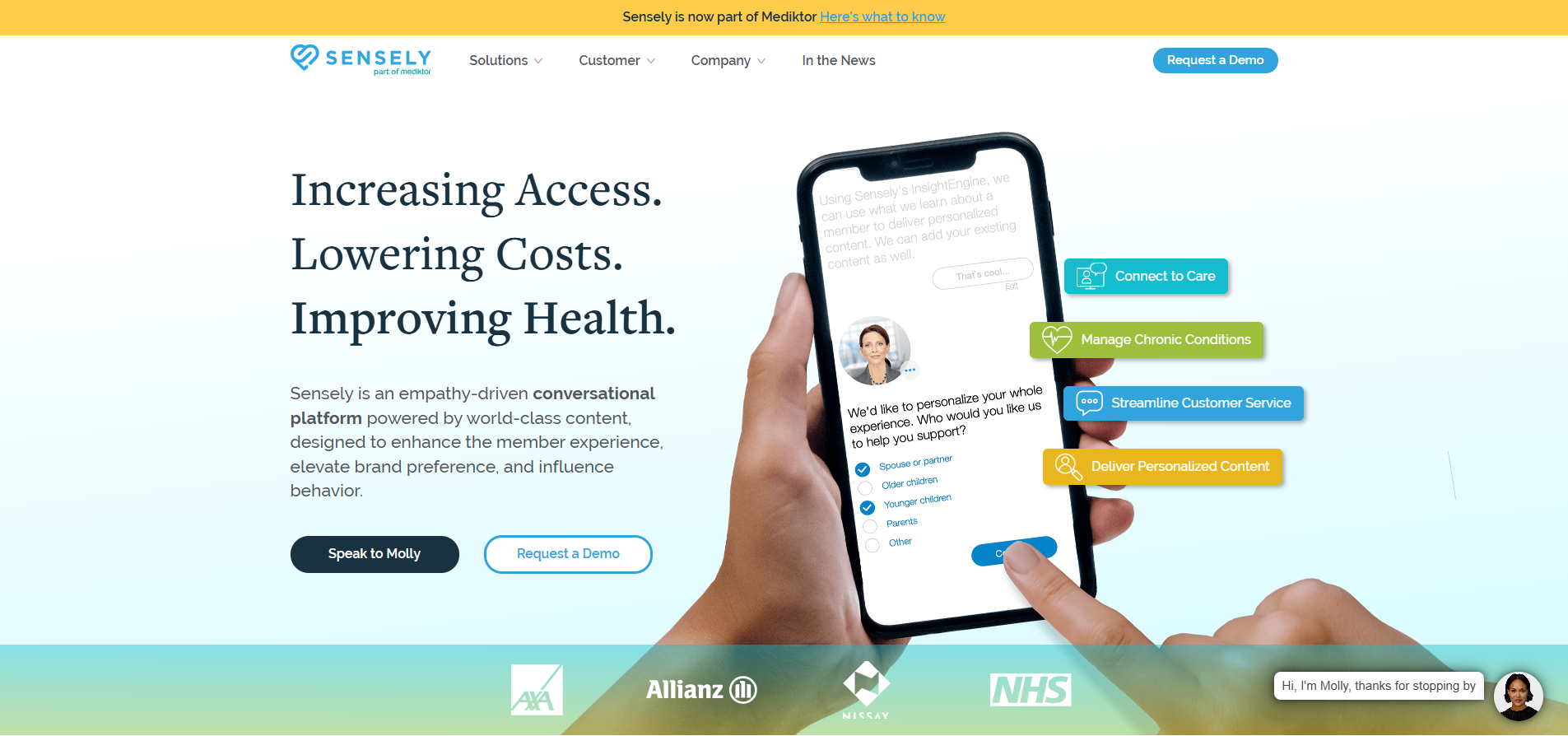 Sensely is a conversational AI platform featuring an empathetic virtual assistant, such as the avatar “Molly”. It is designed to engage patients with symptom checks, care navigation, and emotional support. It uses NLP and emotional tone detection to guide assessments following clinical protocols, then sends structured patient-reported data to EHRs for clinician review. Combined with content from trusted sources like Mayo Clinic and the NHS, Sensely delivers accurate health advice, reminders, and chronic care guidance in over 30 languages. What’s more, its Insight Engine provides real-time user engagement analytics and custom conversation creation tools. All of this makes Sensely a user‑friendly AI agent for both patients and healthcare teams.
Sensely is a conversational AI platform featuring an empathetic virtual assistant, such as the avatar “Molly”. It is designed to engage patients with symptom checks, care navigation, and emotional support. It uses NLP and emotional tone detection to guide assessments following clinical protocols, then sends structured patient-reported data to EHRs for clinician review. Combined with content from trusted sources like Mayo Clinic and the NHS, Sensely delivers accurate health advice, reminders, and chronic care guidance in over 30 languages. What’s more, its Insight Engine provides real-time user engagement analytics and custom conversation creation tools. All of this makes Sensely a user‑friendly AI agent for both patients and healthcare teams.
Features:
Multi-Platform Support
Sensely runs on mobile apps, web portals, and even integrates into call center systems. This ensures patients can interact with the virtual assistant on the platform they’re most comfortable with, whether at home or in a care facility.
Insurance and Benefit Navigation
Sensely isn’t just for clinical care, it also helps users understand insurance plans, check benefits, and locate in-network providers. This reduces administrative burden and helps patients make smarter coverage decisions.
API Integration Capabilities
Sensely offers flexible APIs that allow healthcare organizations to connect its AI assistant with backend systems like CRM tools, EHRs, and remote monitoring platforms. Thus making it highly adaptable to your existing infrastructure.
Regulatory Compliance Ready
Sensely is designed with compliance in mind, following HIPAA and GDPR standards. This makes it suitable for deployments in regulated healthcare environments across multiple countries.
Dynamic Language Switching
Sensely supports instant switching between languages during a live session. This allows multilingual patients to comfortably continue interactions in their preferred language without restarting the conversation.
8. Florence – Medication Reminders (For Patients)
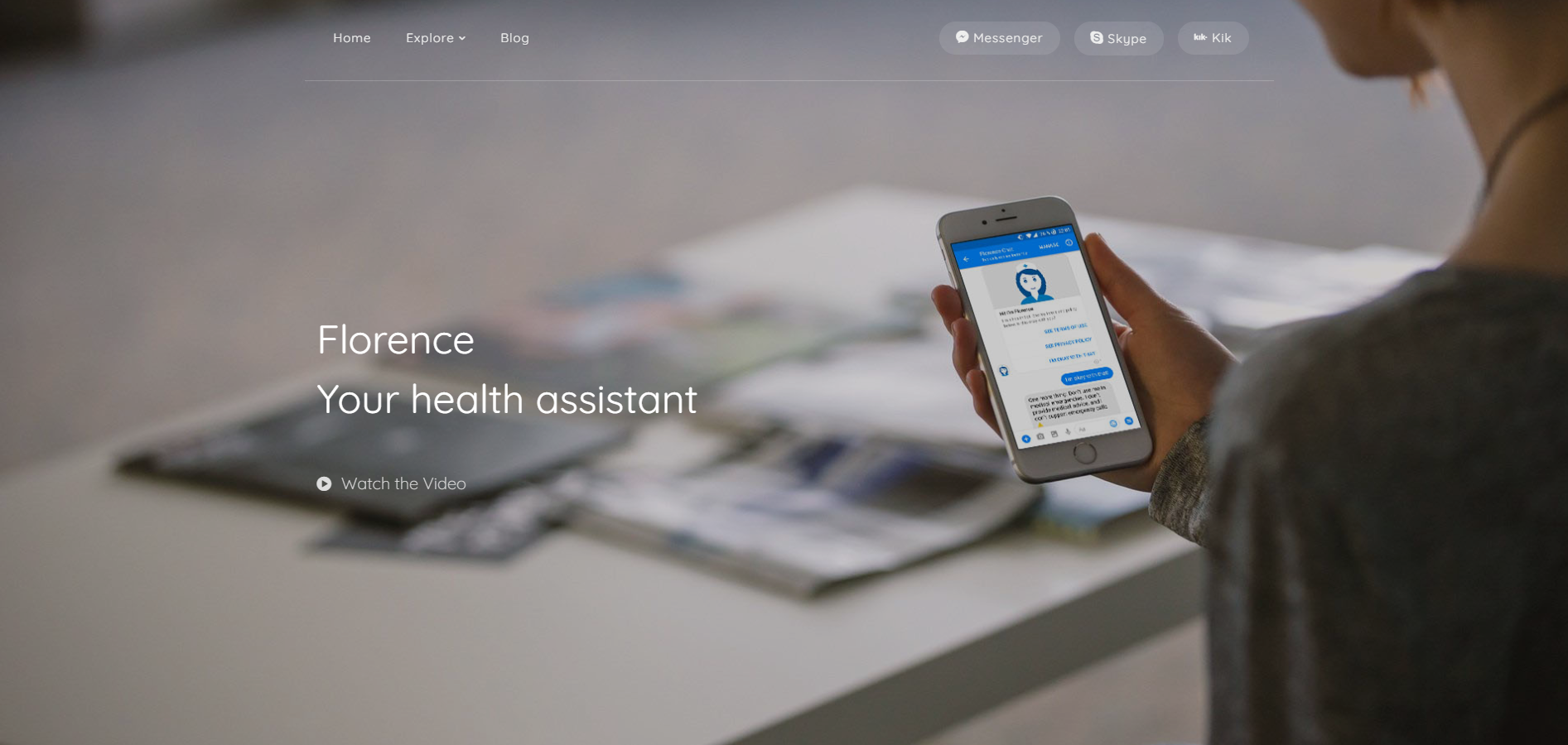 Florence, known as “Florence.chat,” is a simple yet impactful AI-powered health assistant designed primarily for patients. Through familiar platforms like SMS, Messenger, or Skype, Flo sends medication reminders, tracks health habits like mood or weight, and offers basic wellness education. Built from clinician-approved protocols, Florence engages patients over time with automated, empathetic check-ins based on real-world medical guidance. She safely gathers patient-reported data and escalates alerts only when necessary, helping reduce staff workload while keeping patients connected. Overall, Florence blends lightweight AI with patient care to improve adherence and outcomes. Making it one of the most accessible, user-friendly agents for remote care and self-management.
Florence, known as “Florence.chat,” is a simple yet impactful AI-powered health assistant designed primarily for patients. Through familiar platforms like SMS, Messenger, or Skype, Flo sends medication reminders, tracks health habits like mood or weight, and offers basic wellness education. Built from clinician-approved protocols, Florence engages patients over time with automated, empathetic check-ins based on real-world medical guidance. She safely gathers patient-reported data and escalates alerts only when necessary, helping reduce staff workload while keeping patients connected. Overall, Florence blends lightweight AI with patient care to improve adherence and outcomes. Making it one of the most accessible, user-friendly agents for remote care and self-management.
Features:
No App Required
Florence works through messaging platforms like SMS, WhatsApp, Facebook Messenger, and Skype. Patients don’t need to download anything, making it easy to use for people of all ages and tech comfort levels.
Behavior Change Nudges
Florence uses motivational interviewing techniques and friendly nudges to help users stick to health goals. This improves long-term behavior change around diet, exercise, smoking cessation, and medication adherence.
Customizable Care Journeys
Clinicians and care teams can design automated care plans using Florence’s platform. These can include personalized schedules, check-in messages, and reminders customized to the patient’s specific condition or recovery stage.
Symptom Escalation Triggers
If a patient reports worsening symptoms or deviates from their care routine, Florence can trigger alerts or escalate the issue to a care manager. Thus ensuring timely human follow-up when needed.
Low-Bandwidth Friendly
Florence is optimized for low-bandwidth environments, which makes it ideal for rural, low-income, or remote populations. It ensures reliable communication even with limited internet access.
9. Biofourmis – Remote Monitoring and Risk Alerts (For Nurses)
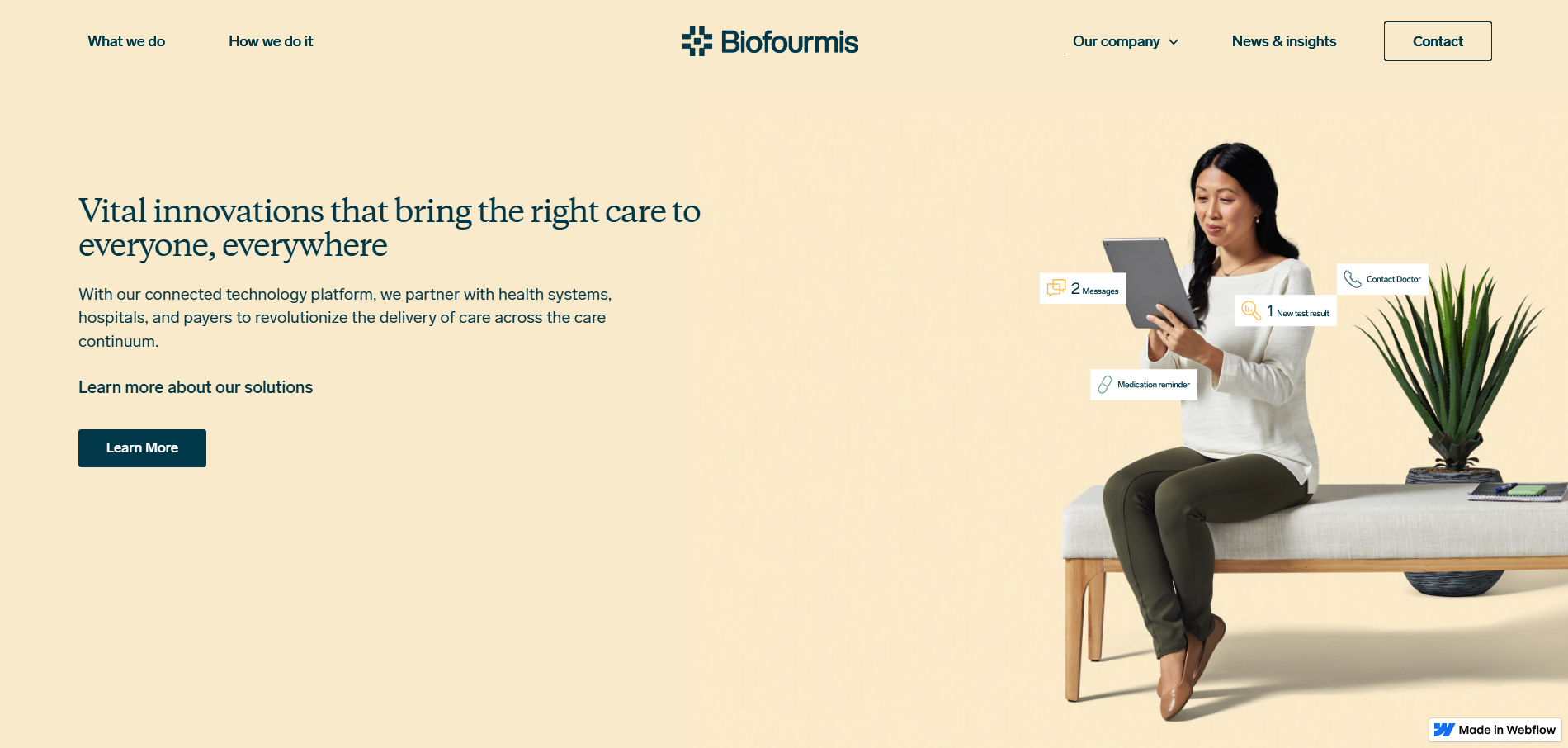 Biofourmis delivers an AI-powered remote monitoring platform that extends care beyond the hospital. By combining wearable sensors with FDA-cleared predictive analytics, it tracks vitals like heart rate and respiratory data to detect health changes early and enable timely interventions. The platform supports hospital-at-home models and complex chronic care plans through configurable care pathways. It integrates data securely into one dashboard used by clinical teams, combining virtual in-home services with 24/7 patient monitoring. Trusted by over 150,000 patients and major health systems, Biofourmis delivers real clinical impact: reduced readmissions, improved care coordination, and cost savings across care settings.
Biofourmis delivers an AI-powered remote monitoring platform that extends care beyond the hospital. By combining wearable sensors with FDA-cleared predictive analytics, it tracks vitals like heart rate and respiratory data to detect health changes early and enable timely interventions. The platform supports hospital-at-home models and complex chronic care plans through configurable care pathways. It integrates data securely into one dashboard used by clinical teams, combining virtual in-home services with 24/7 patient monitoring. Trusted by over 150,000 patients and major health systems, Biofourmis delivers real clinical impact: reduced readmissions, improved care coordination, and cost savings across care settings.
Features:
Predictive Clinical Insights
Biofourmis uses AI to transform raw vital signs into risk predictions, forecasting issues like heart failure or infection up to 48 hours in advance. It empowers clinicians to intervene early and act before conditions escalate.
Configurable Care Pathway Builder
With Biofourmis, you can create tailored care plans using preset algorithms and patient-specific rules. This makes it easy to manage chronic conditions, post-discharge follow-ups, or remote care strategies efficiently across patient groups.
Multi-Device Connectivity
Biofourmis integrates seamlessly with various wearable technologies, smart devices, and Bluetooth sensors. This flexibility allows smooth data collection, even from patient homes, without interference in daily routines.
Dynamic Escalation Alerts
The system escalates alerts not only on vital thresholds but also on predictive trend changes, thus informing nurses and care teams with actionable context, not just raw numbers. This helps prevent alarm fatigue and supports smarter decisions.
Outcome-Based Analytics & Dashboards
Biofourmis offers customizable dashboards that track patient trajectories, readmission rates, and intervention effectiveness. This insight lets you measure program success, refine workflows, and monitor overall clinical ROI.
10. Notable – Admin and Workflow Tasks (For Nurses + Admins)
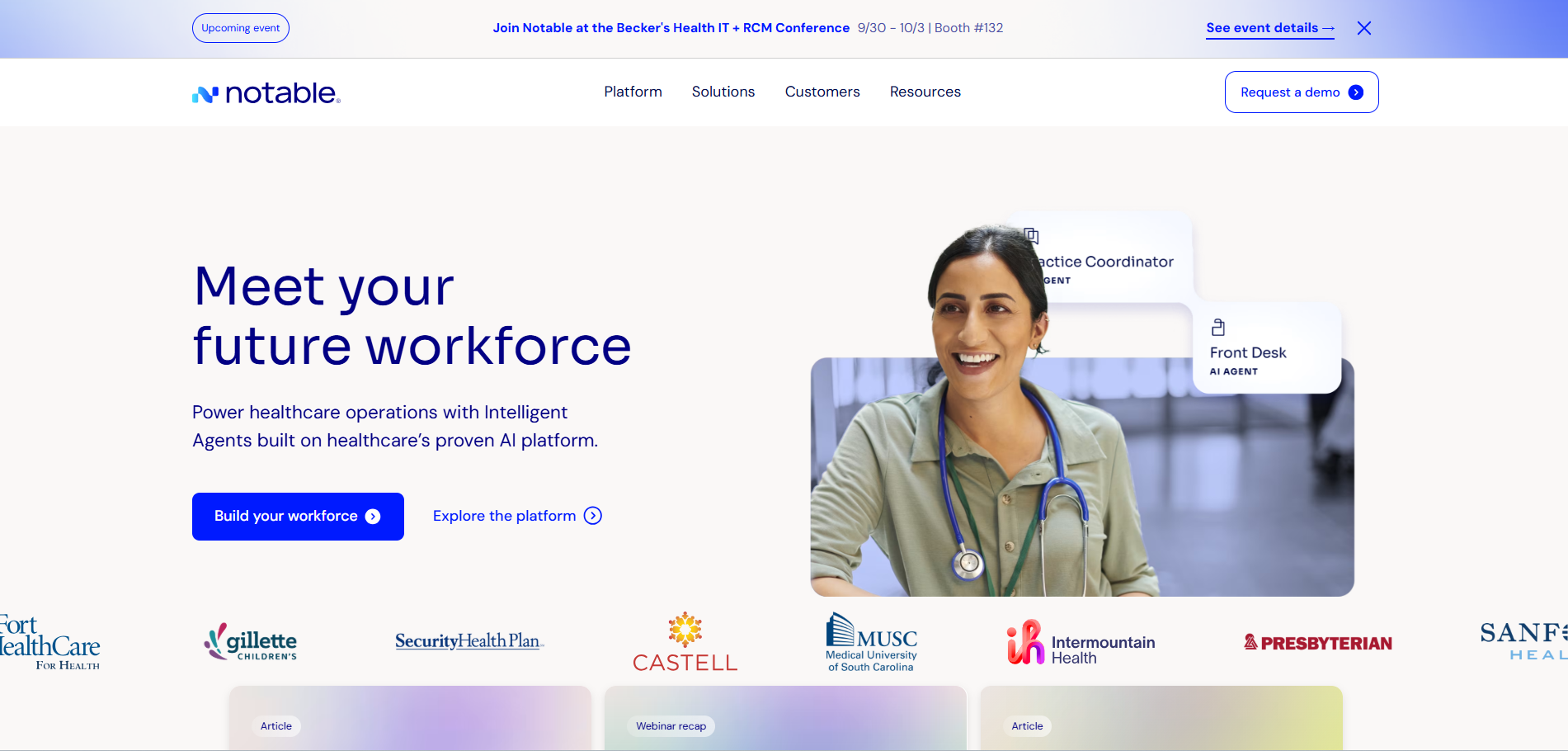 Notable delivers intelligent automation that empowers healthcare teams, including nurses, admins, and care coordinators to manage tasks more efficiently. Its AI agents fully orchestrate workflows such as patient intake, appointment scheduling, insurance authorizations, and referral processing without human intervention. Using a low-code Flow Builder, you can design or customize workflows easily. Notable integrates with EHRs, payer platforms, CRM systems, and support tools, ensuring automation fits into your existing setup without disrupting operations. Moreover, clinical teams gain real-time insights into task statuses and performance metrics. This helps you monitor efficiency and deliver better patient experiences, while freeing staff from repetitive work to focus on care.
Notable delivers intelligent automation that empowers healthcare teams, including nurses, admins, and care coordinators to manage tasks more efficiently. Its AI agents fully orchestrate workflows such as patient intake, appointment scheduling, insurance authorizations, and referral processing without human intervention. Using a low-code Flow Builder, you can design or customize workflows easily. Notable integrates with EHRs, payer platforms, CRM systems, and support tools, ensuring automation fits into your existing setup without disrupting operations. Moreover, clinical teams gain real-time insights into task statuses and performance metrics. This helps you monitor efficiency and deliver better patient experiences, while freeing staff from repetitive work to focus on care.
Features:
Flow Builder No‑Code Editor
Notable’s low-code Flow Builder lets you design and launch AI-powered workflows without writing code. This empowers both clinical and operations teams to automate tasks like referrals or intake within hours.
Library of Out-of-the-Box Agent Workflows
Access pre-built AI agents for common tasks like registration, scheduling, authorizations, and HCC chart review. You can enable these immediately and adapt them to your workflows as needed.
Deep, Flexible Integrations
Notable connects with EHRs, CRM systems, payer portals, and health information exchanges via APIs, RPA, and HL7. It reads and writes data across systems, enabling seamless automation across departments.
AI Skills for Next Best Actions
Using healthcare-specific AI skills, Notable recommends next steps or actions based on real-time data and existing workflows. These actions can include verifying insurance, closing care gaps, or sending reminders.
Scalable Platform with Governance Controls
With enterprise-grade security, role-based access, and change tracking, Notable supports large-scale rollout. It automatically logs every flow and version for auditability and safe deployment.
Webisoft’s Expertise in AI Agents for Healthcare
AI agents are transforming healthcare with faster diagnoses, proactive care, and simplified workflows. Webisoft brings strong expertise in building these tools from smart chatbots to predictive systems, designed to fit real healthcare needs. Here’s what sets Webisoft apart in this space.
Custom AI Agent Development for Healthcare
Webisoft builds healthcare AI agents customized to your needs—like chatbots, symptom checkers, or virtual care assistants. These tools align with your workflows and data, so your team gets real-time, intelligent support without friction. The result? Smarter automation that actually fits how your organization runs every day.
Seamless Integration with Healthcare Systems
Your new AI agent won’t break your current setup. Webisoft ensures smooth integration with EHRs, scheduling tools, and CRMs using standards like HL7 and FHIR. This means faster data flow, fewer manual updates, and a consistent experience for both your staff and patients across all touchpoints.
Compliance, Security & Scalable Solutions
In healthcare, trust is everything. Webisoft builds AI solutions that follow HIPAA and other key regulations, with secure access, data encryption, and audit trails. Their scalable approach means your AI grows as you grow—no need to rip out systems when you’re ready to expand or upgrade.
End-to-End Product Development Support
Webisoft doesn’t just build the AI agent—they help you plan, design, test, and launch it. From idea to deployment, their team works closely with you at every step. This ensures your healthcare AI solution is not only functional, but also user-friendly, reliable, and ready for real-world use.
Real-Time Data & Predictive Insights
Webisoft builds AI agents that don’t just respond—they anticipate. By tapping into real-time data streams, your AI agents can predict patient risks or operational bottlenecks before they happen. This helps you act faster, reduce errors, and improve care outcomes with smart, timely decisions powered by AI.
Final Thoughts
AI agents for healthcare are no longer optional, they’re becoming essential to modern care delivery, much like AI agents transforming business across other industries. They reduce manual work, support clinical decisions, and help healthcare teams focus on patients rather than paperwork. This shift isn’t about replacing professionals, it’s about giving them the right tools to work smarter and deliver better outcomes. If you’re looking to build AI agents customized to real healthcare needs, Webisoft has the expertise to turn your ideas into secure, reliable, and scalable solutions.
Frequently Asked Question
How do AI agents interact with patients?
AI agents engage with patients through mobile apps, chatbots, voice assistants, and web portals. They offer help with symptom checks, medication reminders, appointment updates, and follow-up care, making healthcare more accessible, consistent, and easier to manage.
Can AI agents handle sensitive patient data?
Yes, AI agents can manage sensitive data if built with strong encryption, secure servers, and strict access controls. They must also comply with regulations like HIPAA and GDPR to ensure privacy and trust in medical environments.
What’s the difference between a chatbot and a healthcare AI agent?
Chatbots follow fixed scripts to respond to basic patient queries. AI agents, however, analyze medical data, understand clinical context, and take intelligent actions. Thus making them far more capable for real-time support in healthcare environments.


